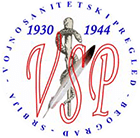Issue: Vojnosanit Pregl 2023; Vol.80 (No. 6)
Above-knee amputation due to necrotizing fasciitis caused by a gas-producing strain of Escherichia coli and negative pressure therapy assisted closure of a large open wound
Authors:
Slobodan Pešić, Snežana Tulenčić-Egić, Mihajlo Zwick
Introduction. Nonclostridial gas-forming soft tissue infec-tions (NGSTI) are rare, rapid progressive infections character-ized by high mortality and high amputation rates. Surgical deb-ridement is crucial in therapy, and it results in complex wounds that need to be closed in order to prevent secondary morbidity. Case report. Herein we present a case of NGSTI in a 68-year-old diabetic patient with acute thrombosis of pop-liteal artery aneurysm and radiological signs of gas in his right leg and the urinary bladder wall. The infection was caused by a gas-forming strain of Escherichia coli. In the early stage of the disease, the patient was treated with antibiotics and femoral amputation. A vacuum-assisted closure (VAC) treatment was applied to close the amputation wound. Administered VAC therapy resulted in primary wound closure without complica-tions 17 days after surgery. Conclusion. Negative pressure in-creases the clearance of fluid and infection from the wound but also increases wound contraction and approximation of skin flaps. To avoid extensive reconstructive surgery, VAC therapy can be a good adjunctive treatment for closing large open wounds in patients with NGSTI.

